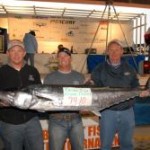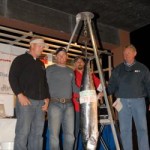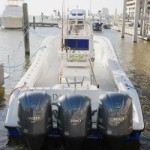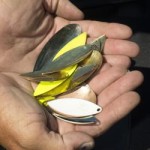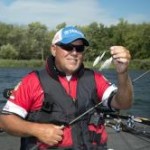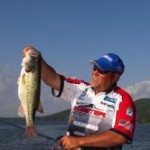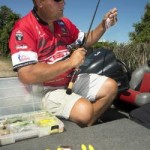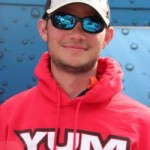
Jordan Lee makes the Classic
Jordan Lee Fishes BOOYAH To Championship, Classic
from The Fishing Wire
Q: What’s in the water at Auburn University?
A: Bass
Auburn student Jordan Lee is on his way to the Bassmaster Classic thanks to a win in the College Championship.
For two years in a row, final round of the Carhartt College Series Bassmaster Classic tournament came down to two Auburn University anglers battling for the opportunity to fish the Bassmaster Classic. One of them, Jordan Lee, was in that same position last year, then fishing against his brother, Matt. Matt edged him out and qualified to fish the 2013 Classic on Oklahoma’s Grand Lake O’ The Cherokees.
This year the anglers were fishing for entry to a Classic held on a body of water Jordan considers his home lake, and his final-day opponent was an angler he considers “like a brother,” his best friend and tournament partner Shane Powell.
“We’ve been best friends since we started college,” Shane said. “We’ve been tournament partners since the first semester.”
The three-day event on the Grand River in Michigan pitted one team from Auburn, one from Eastern Washington University, one from Young Harris College and one from Auburn University at Montgomery in a head-to-head bracket style tournament. With Jordan in the top half of the bracket and his partner Shane in the bottom half, a best-friend-versus-best-friend finals was a distinct possibility.
If Shane and Jordan beat the competitors they were matched against on Friday and Saturday, Sunday would again be an all-Auburn final. And that’s how it went down.
Launch for the event was in the Spring Lake area of Grand River, and Jordan fished the lake the entire tournament, while Shane normally picked up a fish or two from areas around the ramp before fishing a portion of the river for the rest of the tournament. Jordan found an area in the lake that featured water depths he liked, docks and vegetation, and this 600- to 700-yard stretch is where he fished all three days.
The Booyah Poppin’ Pad Crasher frog scored well for Lee in the backs of coves during the tournament.
Jordan rode three main lures to the trophy, a BOOYAH Poppin’ Pad Crasher for skipping under docks and to vegetation, a 3/8-ounce BOOYAH Blade spinnerbait retrieved at high speeds, and a YUM Wooly Bug for flipping.
When the water was flat he could catch them on the Poppin’ Pad Crasher, a hollow body frog with a cupped mouth that chugs water, especially when the sun was bright. Early mornings and when there was chop or a lot of boat wakes he caught his fish on the double willowleaf spinnerbait in Snow White color pattern. His spinnerbait fish hit while he “burned” the bait around docks.
When the wind really kicked up and boat traffic was at its highest on Saturday, he flipped the Wooly Bug around the docks and caught six or seven more, culling a few times.
He said the pieces to his pattern really didn’t come together until the first day of the tournament, when he caught four of his five-fish limit on the Poppin’ Pad Crasher, including big bass of the tournament, a 4-pound, 1-ounce largemouth that netted him an extra $500 on top of the boat, truck and $5,000.
Lee also scored by “burning” a Booyah Blade in 3/8 ounce size, which he said matched the baitfish at Grand River.
He caught his fifth Day 1 weigh-in fish burning the spinnerbait, and brought the biggest sack of the tournament to the scales, 15-pounds, 2-ounces.
What keyed him into the spinnerbait bite was the size of the baitfish in the area he was fishing. The smaller spinnerbait blades on the BOOYAH Blade matched the size of baitfish. He also trimmed the skirt up to the point right beyond the hook bend to give it a smaller overall profile.
The frog he skipped as shallow as possible under and around docks as well as in any vegetation that was protected from the wind. Color pattern on the Poppin’ Pad Crasher was Aqua-Frog, and he trimmed the spinnerbait-style legs to give it a more subtle surface disturbance.
“I also trimmed one leg about a half-inch shorter than the other so it walked easier,” he said.
On day two, extra boat traffic and wind created more chop than the other two days. He’d put a small limit in the livewell, but the conditions were so different than what he’d experienced that with an hour-and-a-half left he pulled out a flippin’ stick and started hitting the docks with a Wooly Bug in Green Pumpkin color.
Lee also added a few fish to his bag by flippin’ a YUM Wooly Bug soft plastic.
“I caught five or six fish and culled once or twice,” he said “I knew there were still fish there but they wouldn’t hit the frog or the spinnerbait. The Wooly Bug is a smaller flippin’ bait that also matched the size of the baitfish.”
At Day 2 weigh-in, Shane brought in a limit weighing 11-pounds, 7-ounces, to win his bracket, and Jordan easily won his match-up, so the final day was set for an emotional, all-Auburn shoot-out.
Jordan started the day by burning the spinnerbait around docks and had a good limit within an hour or so. He culled several times before the action slowed, then switched to the frog and started hitting the calm areas at the backs of docks and in any vegetation, and culled again before heading to the final weigh-in.
Shane brought his bag to the stage first, and even though it held big-bass for the day, was one short of a limit. Jordan brought in a 5-bass limit weighing an even 12 pounds, and celebrated with the monkey off his back and his ticket to the Classic punched.
“I told (Shane) I know how he feels,” Jordan said. “I felt that way last year, getting beaten by my brother, and honestly it made me work harder. I told Shane’s parents the day before that I would be pulling for him, and that he’s my best friend. We all want to fish the Classic.”
For Jordan, getting to fish a Bassmaster Classic on his home lake is like a dream come true. It’s a body of water he fishes more than 30 times a year, and loves fishing it in winter and early spring. He even recalled skipping high school basketball practice one February day to prefish a tournament on Guntersville.
“I grew up fishing there,” he said. “I fished my first tournament on Guntersville when I was 15 years old. Last year I won a BFL there, and a B.A.S.S. Weekend Series event there in early March of 2009. It’s probably my favorite place to fish.”
